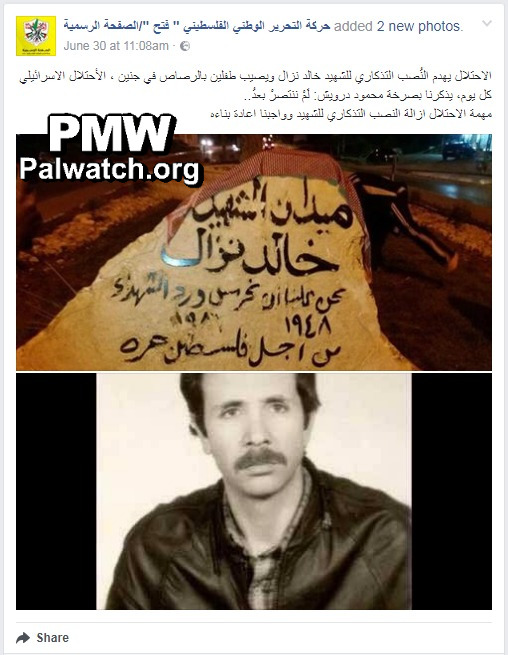Fatah vows to rebuild terrorist monument after Israel dismantled it
Images and text posted on the official Fatah Facebook page

Posted text: “The occupation destroyed the monument in memory of Martyr (Shahid) Khaled Nazzal (i.e., terrorist, responsible for murder of 31) and shot and wounded two children in Jenin (sic., six Palestinians were wounded while attacking the Israeli forces removing the monument). The Israeli occupation reminds us every day of [poet] Mahmoud Darwish’s cry: ‘We still have not won.’ It does not matter how many times the occupation removes the monument in memory of the Martyr – it is our obligation to rebuild it.”
The images show the monument that was removed and a picture of terrorist Khaled Nazzal.
Text on monument: “Martyr Khaled Nazzal Square
We must guard the flowers of the Martyrs (quote from poem by Palestinian poet Mahmoud Darwish –Ed.)
1948-1986, for free Palestine"
Khaled Nazzal – Palestinian terrorist and Secretary of the Central Committee of the Democratic Front for the Liberation of Palestine (DFLP), and commander of its military branch. He was responsible for terrorists taking school children as hostages and murdering 22 children and 4 adults in Ma’alot (May 15, 1974), the murder of 4 hostages in an apartment building in Beit Shean on Nov. 19, 1974, and a shooting and grenade attack in central Jerusalem in which 1 was murdered and 47 others were wounded on April 2, 1984.
Mahmoud Darwish is considered the Palestinian national poet. He published over 30 volumes of poetry and 8 books of prose and has won numerous awards. He joined the Israeli Communist Party in 1961 and the terrorist organization PLO in 1973, becoming a member of the PLO Executive Committee in 1987. He left the PLO in 1993 because it signed the Oslo Accords with Israel. Many in Israel see his poetry as inciting hate and violence. One poem he wrote in 1988 at the height of the Palestinian wave of violence and terror against Israel in which approximately 200 Israelis were murdered (the first Intifada, 1987-1993) calls to Israelis: “Take your portion of our blood - and be gone… Live wherever you like, but do not live among us… Die wherever you like, but do not die among us… Leave our country, our land, our sea, our wheat, our salt, our wounds, everything, and leave the memories of memory.” In 1964, he wrote a poem entitled "ID Card" in which he said: "I do not hate people, And I do not steal from anyone, But if I starve I will eat my oppressors' flesh; Beware, beware of my starving, And my rage." He also wrote “Silence for the Sake of Gaza” in 1973, which many see as glorifying terror: “She wraps explosives around her waist and blows herself up. It is not a death, and not a suicide. It is Gaza's way of declaring she is worthy of life.” His defenders have claimed that Israel misinterprets his poetry and that he sought reconciliation with Israel. One wrote in 2017: “Darwish arranged meetings between Palestinian and Israeli intellectuals, and published essays on their discussions. He was optimistic that, through mutual understanding, the two sides could eventually reconcile.” [https://www.bcalnoor.org/]
» View analysis citing this item